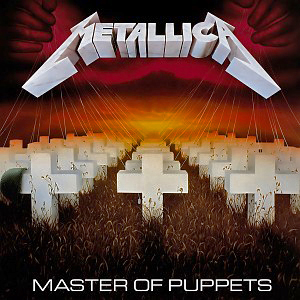
Master of Puppets is the third studio album by the American heavy metal band Metallica, released on March 3, 1986, by Elektra Records. Recorded in Copenhagen, Denmark at Sweet Silence Studios with producer Flemming Rasmussen, it was the band's final album to feature bassist Cliff Burton, who died in a bus accident in Sweden during the album's promotional tour.
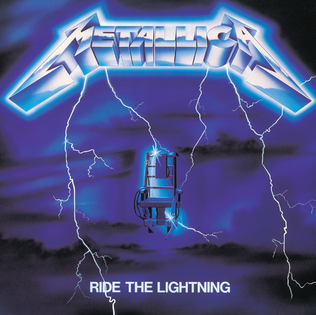
Ride the Lightning is the second studio album by the American heavy metal band Metallica, released on July 27, 1984, by the independent record label Megaforce Records. The album was recorded in three weeks with the producer Flemming Rasmussen at Sweet Silence Studios in Copenhagen, Denmark. The artwork, based on a concept by the band, depicts an electric chair being struck by lightning flowing from the band logo. The title was taken from a passage in Stephen King's novel The Stand, in which a character uses the phrase to refer to execution by electric chair.

Metallica is the fifth studio album by American heavy metal band Metallica. It was released on August 12, 1991, by Elektra Records. Recording sessions took place at One on One Recording Studios in Los Angeles over an eight-month span that frequently found Metallica at odds with their new producer Bob Rock. The album marked a change in the band's music from the thrash metal style of their previous four albums to a slower, heavier, and more refined sound.

Metallica is an American heavy metal band. The band was formed in 1981 in Los Angeles by vocalist and guitarist James Hetfield and drummer Lars Ulrich, and has been based in San Francisco for most of its career. The band's fast tempos, instrumentals and aggressive musicianship made them one of the founding "big four" bands of thrash metal, alongside Megadeth, Anthrax and Slayer. Metallica's current lineup comprises founding members and primary songwriters Hetfield and Ulrich, longtime lead guitarist Kirk Hammett and bassist Robert Trujillo. Guitarist Dave Mustaine, who formed Megadeth after being fired from Metallica, and bassists Ron McGovney, Cliff Burton and Jason Newsted are former members of the band.

...And Justice for All is the fourth studio album by American heavy metal band Metallica, released on August 25, 1988, by Elektra Records. It was the first Metallica album to feature bassist Jason Newsted, following the death of their previous bassist Cliff Burton in 1986. Burton received posthumous co-writing credit on "To Live Is to Die" as Newsted followed bass lines Burton had recorded prior to his death.

Kill 'Em All is the debut studio album by the American heavy metal band Metallica, released on July 25, 1983, through the independent label Megaforce Records. After forming in 1981, Metallica began by playing shows in local clubs in Los Angeles. They recorded several demos to gain attention from club owners and eventually relocated to San Francisco to secure the services of bassist Cliff Burton. The group's No Life 'til Leather demo tape (1982) was noticed by Megaforce label head Jon Zazula, who signed them and provided a budget of $15,000 for recording. The album was recorded in May with producer Paul Curcio at the Music America Studios in Rochester, New York. It was originally intended to be titled Metal Up Your Ass, with cover art featuring a hand clutching a dagger emerging from a toilet bowl. Zazula convinced the band to change the name because distributors feared that releasing an album with such an offensive title and artwork would diminish its chances of commercial success.

James Alan Hetfield is an American musician. He is the lead vocalist, rhythm guitarist, co-founder, and a primary songwriter of heavy metal band Metallica. He is mainly known for his intricate rhythm playing, but occasionally performs lead guitar duties and solos both live and in studio. Hetfield co-founded Metallica in October 1981 after answering an advertisement by drummer Lars Ulrich in the Los Angeles newspaper The Recycler. Metallica has won nine Grammy Awards and released 11 studio albums, three live albums, four extended plays, and 24 singles. Hetfield is often regarded as one of the greatest heavy metal rhythm guitar players of all time.

Lars Ulrich is a Danish musician best known as the drummer and co-founder of American heavy metal band Metallica. The son and grandson respectively of tennis players Torben and Einer Ulrich, he played tennis in his youth and moved to Los Angeles at age 16 to train professionally. However, rather than playing tennis, Ulrich began playing drums. After publishing an advertisement in The Recycler, Ulrich met James Hetfield and formed Metallica. Along with Hetfield, Ulrich has songwriting credits on almost all of the band's songs, and the two of them are the only remaining original members of the band.

"Creeping Death" is a song by American heavy metal band Metallica. It was released on November 23, 1984, as the lead and only commercial single from their album Ride the Lightning. Written from the perspective of the Angel of Death, "Creeping Death" describes the tenth plague of Egypt. It is often thought of as one of the band’s most popular songs and is currently the second-most-played song live by them.

"Nothing Else Matters" is a song by American heavy metal band Metallica. A power ballad, it was released in 1992 as the third single from their self-titled fifth studio album, Metallica. The song peaked at number 11 on the Billboard Mainstream Rock Tracks chart, number 6 on the UK Singles Chart, number 1 in Denmark, and reached the top ten on many other European charts. Recognized as one of Metallica's best known and most popular songs, it has become a staple in live performances.
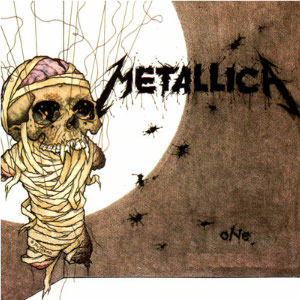
"One" is a song by American heavy metal band Metallica, released as the third and final single from the band's fourth studio album, ...And Justice for All (1988). Written by band members James Hetfield and Lars Ulrich, the song portrays a World War I soldier who is severely wounded—arms, legs and jaw blown off by a landmine, blind and unable to speak or move—begging God to take his life. In the music video, attempting to communicate with the hospital staff he jolts in his bed, spelling SOS in Morse code. Production of the song was done by the band alongside Flemming Rasmussen. The song was the band's first to chart in the U.S., reaching number 35 on the Billboard Hot 100. It was also a number one hit in Finland.
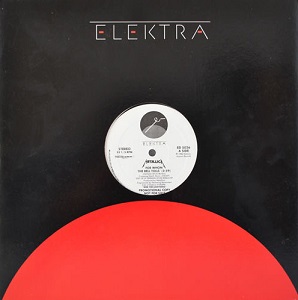
"For Whom the Bell Tolls" is a song by American heavy metal band Metallica. It was first released on their second studio album, Ride the Lightning (1984). Elektra Records also released it as a promotional single, with both edited and full-length versions. The song is generally regarded as one of Metallica's most popular; by March 2018, it ranked number five on their live performance count. Several live albums and video albums include the song. In March 2023, Rolling Stone magazine ranked "For Whom the Bell Tolls" at number 39 on their "100 Greatest Heavy Metal Songs of All Time" list.

"Master of Puppets" is a thrash metal song by American metal band Metallica, released on July 2, 1986, as the only single from the album of the same name. It was also issued as a promo single in the US by Elektra Records.

"The Unforgiven" is a power ballad by American heavy metal band Metallica. It was released as the second single from their eponymous fifth album Metallica. The song deals with the theme of the struggle of the individual against the efforts of those who would subjugate him.
"Orion" is a song by American heavy metal band Metallica from their third studio album, Master of Puppets, released on March 3, 1986, by Elektra Records. There the song features as track seven, and is entirely instrumental. "Orion" was written primarily by bassist Cliff Burton. The song was named after the constellation of the same name, Orion, due to its "spacey sounding" bridge.
The Shit Hits the Sheds was a concert tour by the American heavy metal band Metallica, which took place in 1994. The band played in 51 shows in North America, including a performance at Woodstock '94, which had an attendance of over 300,000 people.
"Seek & Destroy" is a song by the American heavy metal band Metallica and the ninth track from their debut studio album, Kill 'Em All (1983). It was also featured on the demo No Life 'Til Leather. It was the first song the band recorded in a studio. "Seek & Destroy" has been frequently performed at the group's concerts since its live debut in 1982 and had been Metallica's closing song from the Madly in Anger with the World Tour to the Metallica By Request Tour. It is the third-most performed song in the band's history, having been played 1,525 times as of October 2019, behind only "Creeping Death" (1,533) and "Master of Puppets" (1,670).
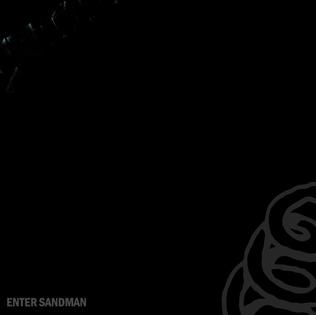
"Enter Sandman" is a song by American heavy metal band Metallica. It is the opening track and lead single from their self-titled fifth album, released in 1991. The music was written by Kirk Hammett, James Hetfield and Lars Ulrich. Vocalist and guitarist Hetfield wrote the lyrics, which deal with the concept of a child's nightmares.
"Battery" is a song by the American heavy metal band Metallica. It is the first track from the band's third studio album, Master of Puppets.















